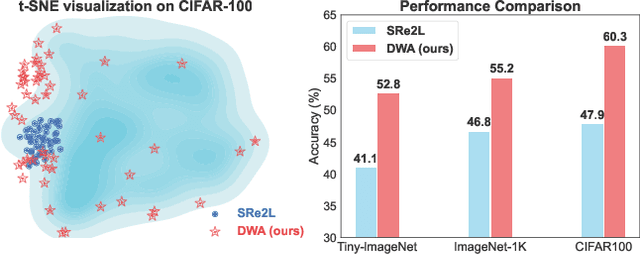Diversity-Driven Synthesis: Enhancing Dataset Distillation through Directed Weight Adjustment
Paper and Code
Sep 26, 2024



The sharp increase in data-related expenses has motivated research into condensing datasets while retaining the most informative features. Dataset distillation has thus recently come to the fore. This paradigm generates synthetic dataset that are representative enough to replace the original dataset in training a neural network. To avoid redundancy in these synthetic datasets, it is crucial that each element contains unique features and remains diverse from others during the synthesis stage. In this paper, we provide a thorough theoretical and empirical analysis of diversity within synthesized datasets. We argue that enhancing diversity can improve the parallelizable yet isolated synthesizing approach. Specifically, we introduce a novel method that employs dynamic and directed weight adjustment techniques to modulate the synthesis process, thereby maximizing the representativeness and diversity of each synthetic instance. Our method ensures that each batch of synthetic data mirrors the characteristics of a large, varying subset of the original dataset. Extensive experiments across multiple datasets, including CIFAR, Tiny-ImageNet, and ImageNet-1K, demonstrate the superior performance of our method, highlighting its effectiveness in producing diverse and representative synthetic datasets with minimal computational expense.
 Add to Chrome
Add to Chrome Add to Firefox
Add to Firefox Add to Edge
Add to Edge